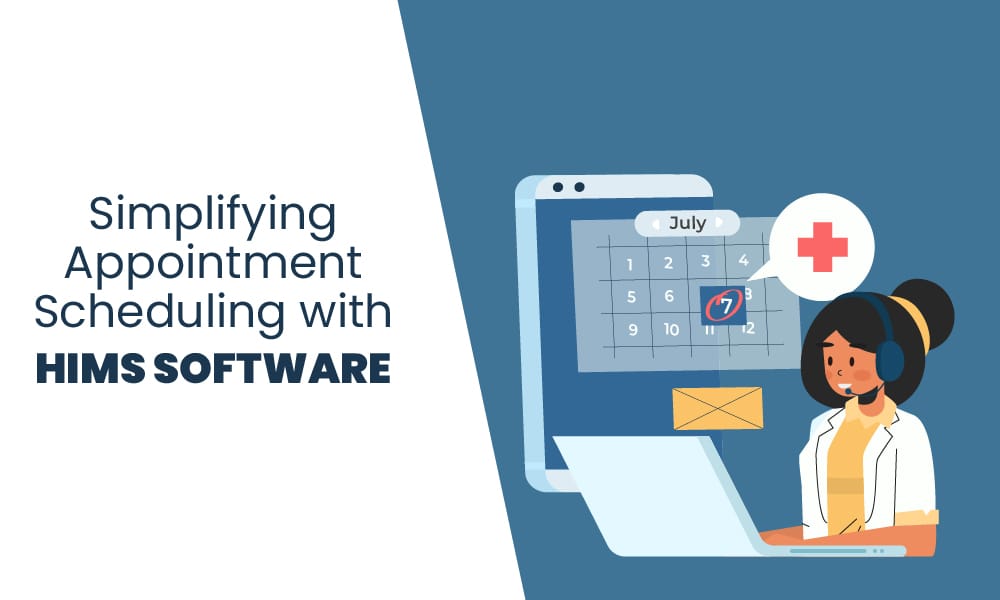
In the fast-paced world of healthcare, Appointment Scheduling with HIMS Software is no longer a luxury but a critical necessity. Hospitals and clinics face constant challenges with walk-in rush, long waiting lines, rescheduling conflicts, and missed consultations. Manual processes, disconnected systems, and poor coordination lead to inefficiencies, patient dissatisfaction, and burnout among hospital staff.
This is where Hospital Information System (HIMS) software comes into play. By automating and digitising the appointment booking system, HIMS software for appointment scheduling transforms how hospitals manage patient interactions. The result? Seamless scheduling, real-time slot availability, enhanced patient satisfaction, and improved operational workflows.
Importance of Effective Appointment Scheduling in Healthcare- Why Appointments Matter More Than Ever?
In today’s fast-evolving healthcare environment, patient appointments serve as the first and most frequent interaction point between patients and healthcare providers. Whether it’s a routine check-up, specialist consultation, or follow-up visit, scheduling forms the foundation of timely and effective care delivery. However, without a robust system in place, scheduling can become chaotic, leading to delays, patient dissatisfaction, and overburdened staff.
A streamlined and well-structured appointment scheduling system plays a crucial role in ensuring that hospitals and clinics run efficiently. It not only facilitates timely access to medical services but also supports better resource allocation, helping hospitals maintain a smooth, coordinated care continuum across departments.
Here are the key benefits of an effective appointment scheduling system:
Improved Patient Experience through Minimal Wait Times
Long wait times remain one of the top frustrations for patients. A well-organised scheduling system helps eliminate bottlenecks and overcrowding by efficiently allocating time slots. Patients are more likely to feel valued when they don’t have to spend hours in the waiting room, which boosts trust, satisfaction, and retention rates.

Better Time Management for Physicians and Staff
An effective appointment management solution enables healthcare professionals to plan their schedules with precision. Doctors can dedicate appropriate time to each patient based on case complexity, while administrative staff can manage patient flow without last-minute surprises or disruptions. This leads to higher productivity and less stress for everyone involved.
Reduced No-Shows with Automated Reminders
Missed appointments result in lost revenue and underutilised resources. By integrating automated SMS, email, or app-based reminders, hospitals can significantly reduce no-show rates. These reminders also allow patients to confirm or reschedule their appointments in advance, offering flexibility and improved planning.
Enhanced Operational Efficiency by Reducing Manual Intervention
Digital appointment scheduling eliminates the need for paper-based logs or time-consuming phone calls. This automation reduces human errors, saves staff hours, and allows real-time updates across departments. As a result, hospitals experience faster check-ins, better inter-departmental coordination, and optimised workflows.
In essence, efficient appointment scheduling not only enhances care delivery but also transforms the entire healthcare experience—for both patients and providers.
Also Read- AI’s Capabilities: Remaking HIMS and Telemedicine – Ezovion
Common Challenges in Traditional Appointment Booking
Many hospitals and clinics still depend on outdated appointment methods like logbooks or basic Excel sheets. Here are the most common issues faced:
- Double-booking or appointment overlaps.
- No real-time updates for cancellations or reschedules.
- Limited accessibility for patients to book appointments remotely.
- High rate of no-shows due to lack of automated reminders.
- Resource underutilisation and clinic idle time.
These inefficiencies lead to chaotic outpatient management and patient frustration. It’s time for healthcare providers to switch to a Hospital Information System equipped with a smart appointment scheduling software.
Integrated HIMS Solution for Appointment Booking
A well-integrated Hospital Information Management System (HIMS) solution for appointment booking serves as a critical foundation for seamless patient coordination and efficient clinical workflows. Rather than operating in silos, this system connects directly with key hospital modules such as Electronic Medical Records (EMR), billing, consultation schedules, laboratory management, and more—creating a unified digital healthcare ecosystem.
By bridging the gaps between departments, this integration not only streamlines appointment scheduling but also enhances overall patient care, operational visibility, and resource optimisation.
The key advantages of an integrated HIMS appointment system are
1. Real-Time Slot Booking
Patients can access available appointment slots instantly through mobile apps or web portals, eliminating the need for time-consuming phone calls or physical visits. The real-time booking functionality ensures that the slots displayed are up-to-date and reflect the most accurate availability, preventing double-booking or missed opportunities. This convenience increases patient satisfaction and encourages proactive engagement with healthcare services.
2. Doctor Calendar Synchronisation
The system seamlessly syncs with individual doctor calendars and updates in real time with any changes—be it emergency leaves, shift modifications, or speciality consultations. This synchronisation ensures that appointments are never booked during unavailable times, thereby improving clinical time management and reducing scheduling errors.
3. Patient History Access
With integrated access to Electronic Medical Records (EMR), doctors can instantly view a patient’s medical history, past treatments, allergies, diagnostic reports, and prescriptions during the booking or consultation phase. This empowers physicians to make better-informed decisions and offer more personalised care, significantly improving diagnostic accuracy and treatment planning.
4. Multi-location Support
Integrated systems are especially beneficial for healthcare groups operating across multiple locations. They enable centralised appointment coordination, allowing patients to book visits at the nearest or most convenient facility. This feature supports operational scalability and ensures consistent service quality across branches.
5. Automated Workflow Routing
The system automatically notifies other departments—such as radiology, pathology, or pharmacy—about appointment-specific requirements. For example, if a doctor schedules a follow-up requiring lab tests, the lab is notified in advance, improving interdepartmental coordination and reducing wait times for patients.
Also read- Hospital Information System for Better Patient Engagement – Ezovion
What Benefits Hospitals Get From Integrated HIMS Solution In Terms Of Appointments?
| Benefit Area | Estimated Improvement (%) | Supporting Feature in HIMS |
| Reduction in Patient Wait Time | 40 | Real-time slot management |
| Decrease in Appointment Errors | 50 | Integrated calendar & conflict detection |
| Improvement in Patient Satisfaction | 35 | Automated reminders & patient portals |
| Increase in Appointment Booking Efficiency | 60 | Multi-channel booking interface |
| Reduction in No-Show Rates | 30 | SMS/email reminders & confirmations |
| Reduction in Administrative Workload | 45 | Paperless scheduling with real-time sync |
| Improved Doctor Time Utilization | 25 | Smart time-slot optimization |
The table presents estimated benefits of using an Integrated HIMS Solution for Appointment Booking across key operational areas in hospitals. It highlights percentage improvements such as a 40% reduction in patient wait time, a 50% drop in appointment errors, and a 60% boost in booking efficiency. These figures are supported by specific HIMS features like real-time slot management, automated reminders, and smart scheduling, all of which contribute to enhanced patient care and streamlined hospital operations.
Top Features of Appointment Scheduling in Hospital Software
Modern appointment scheduling software goes far beyond simply filling time slots. It is a comprehensive tool that optimises patient flow, reduces administrative burdens, and enhances patient satisfaction. Here are the top features that make hospital scheduling systems more intelligent, efficient, and patient-friendly:
• Smart Slot Management
This feature automatically assigns appointments based on real-time doctor availability, medical specialisation, consultation duration, and patient urgency. The system prevents double-booking, avoids resource conflicts, and ensures that critical or follow-up patients get prioritised slots. This reduces the burden on front-desk staff and minimises human error.
• Online Self-Service Portals
Through secure web and mobile portals, patients can independently book, reschedule, or cancel their appointments anytime. These self-service tools promote patient empowerment, decrease the volume of inbound calls to hospital staff, and offer greater convenience—especially for tech-savvy or remote patients.
• Automated Reminders and Notifications
The system sends timely appointment alerts via SMS, email, or app notifications. These automated reminders reduce no-show rates significantly, keeping appointment slots utilised efficiently. Some systems also allow two-way communication for confirmations or cancellations.
• Multi-Channel Booking Integration
Patients can schedule appointments through multiple touchpoints—such as hospital websites, mobile apps, kiosks, or call centers. All bookings sync into a unified dashboard, giving hospital staff full visibility and control over scheduling, regardless of the source.
• Queue Management Integration
The software provides real-time updates on expected wait times, check-in windows, and consultation status. This transparency enhances patient experience by reducing perceived waiting time and managing expectations.
• Reports and Analytics
Advanced dashboards track key performance indicators like peak booking times, no-show percentages, average consultation duration, and doctor utilisation. These insights help administrators make data-driven decisions to optimise schedules and improve service quality.
Also Read- HIMS Software in Healthcare Analytics | Ezovion
How HIMS Improves Patient Appointment Efficiency?
Efficient scheduling is not just about speed—it’s about coordinated care and optimised resources. Here’s how HIMS software for appointment scheduling improves patient interactions:
- Faster Check-ins: Patients already booked and registered through the system can walk in with minimal paperwork.
- Reduced Wait Times: Smart scheduling avoids overbooking and minimises patient wait times.
- Personalised Experience: The system remembers patient preferences, past interactions, and auto-suggests relevant services.
- Follow-Up Scheduling: Automatically prompts patients and doctors for timely follow-ups, enhancing continuity of care.

The Future: AI-Based HIMS Appointment Scheduling (2025–2030)
As the healthcare industry continues its digital evolution, the next leap will be AI-powered appointment scheduling embedded within HIMS software.
So, what will AI bring to appointment scheduling?
- Predictive Slot Management: AI will analyse historical appointment data to suggest optimal time slots that reduce idle time and wait periods.
- No-Show Prediction: Machine learning models can identify high-risk no-show patients and prompt follow-up actions.
- Intelligent Resource Allocation: AI will assign appointments based on complexity of cases, specialist availability, and patient urgency.
- Dynamic Load Balancing: AI can reroute patients across branches or reschedule based on real-time resource utilisation.
Why Investing in a HIMS Appointment Scheduling System Is Worth It
Simplifying appointment scheduling with HIMS software is no longer optional—it’s essential. Hospitals face daily challenges in managing appointments, dealing with inefficiencies, and ensuring patient satisfaction. A modern, integrated appointment scheduling software empowers hospitals with smart slot management, reduced wait times, and better resource coordination.
As we move toward 2025 and beyond, incorporating AI into HIMS solutions will further optimise workflows and personalise care. With the right hospital information system, healthcare providers can offer efficient, data-driven, and patient-friendly appointment experiences. Investing in an AI-based, cloud-ready medical scheduling system is the key to a future-proof hospital ecosystem.





